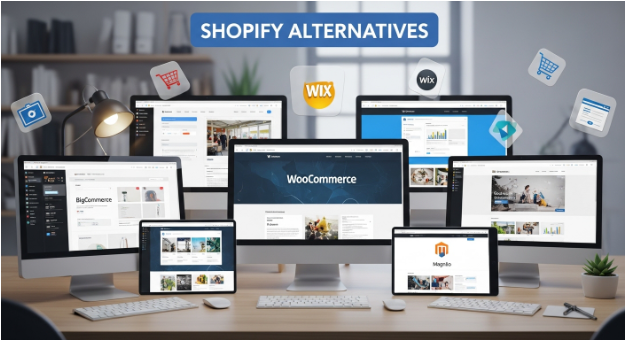All things considered, Shopify is the greatest option for an e-commerce platform. However, there are certain drawbacks, such as extremely monthly costs and limited number of customization options.
Over the past few years, a large number of Shopify competitors have come to light, each with better pricing structures, more flexible design options, and fewer product limitations. Before deciding on a new, full-time e-commerce partner, it's always a good idea to look at some top Shopify alternatives.
Here, we go to ten of the best Shopify alternatives, looking at what makes each one different and how to pick the right fit for your business.
Why Look for Shopify Alternatives?
Shopify gives its users a number of features, including the ability to create beautiful online stores, accept payments from major credit cards, use Shopify upsell solutions, and integrate with various marketing tools. Integration with most third-party applications is very easy using the API.
Nevertheless, it doesn't allow complete ownership of your store data, which most other alternatives do. Shopify guarantees reliable hosting and a high degree of security, but at times this might backfire if the business unexpectedly restricts certain features or increases transaction fees.
Online companies seeking to increase their profit margins and customization freedom, may look for Shopify alternatives which are user-friendly, affordable, and provide smooth control over their entire e-commerce operation.
1. WooCommerce
WooCommerce is one of the first and most popular e-commerce solutions, launched in 2011 as a WordPress plugin. It lets businesses create fully customized online stores, accept multiple payment methods, manage inventory, and handle shipping calculations all under one flexible framework.
With complete ownership of your store data and a global community spanning millions of users, WooCommerce continues to be a default choice for merchants seeking maximum control and customization freedom.
Key Features
- Complete Ownership: Full control over your store data, hosting, and customization.
- WordPress Integration: Seamlessly works with WordPress content management system.
- Extensive Plugin Library: Thousands of free and premium extensions available.
- No Transaction Fees: Pay only for hosting and chosen extensions.
Why Use It? Ideal for businesses who value complete control and have basic technical knowledge. WooCommerce has always been a great bet because of its flexibility plus the mix of content management and e-commerce features.
2. BigCommerce
BigCommerce started out as a hosted e-commerce solution in 2009 and slowly transformed into a full enterprise platform. Based in Austin, TX, it provides not only the store hosting but also built-in marketing tools and advanced SEO features plus multichannel selling. One dashboard can, therefore, be used by companies to manage their sales, inventory, marketing as well as analytics across online and marketplace channels.
Key Features
- Built-in Features: No transaction fees and advanced features included in base plans.
- Multi-Channel Selling: Integrated selling on Amazon, eBay, Facebook, and Instagram.
- Advanced SEO: Built-in optimization tools and customizable URLs.
- API-First Architecture: Headless commerce capabilities and custom integrations.
Why Use It? Perfect for businesses that are growing, established merchants and enterprises who want a scalable platform with advanced features without transaction fees andthird-party apps.
3. PrestaShop
PrestaShop is a company located in Paris, France and was launched in the year 2007. It concentrates on open-source e-commerce solutions which enable businesses to have full control over their online stores. It offers professional themes advanced inventory management and multi-store capabilities features that have endeared it to merchants throughout Europe and international businesses
Key Features
- Open Source: Free core platform with optional paid modules and themes.
- Multi-Store Management: Run multiple stores from one admin panel.
- Advanced Inventory: Sophisticated stock management and product variations.
- European Focus: Built-in GDPR compliance and European payment methods.
Why Use It? Ideal for businesses with technical resources and international presence. It simplifies multi-store operations and European compliance much more than hosted platforms, and lowers long-term costs while providing enterprise features.
4. Ecwid
Ecwid is a San Diego-based, versatile e-commerce platform trusted by small businesses and social commerce pioneers. Launched in 2009, it offers seamless integration through embedded widgets for existing websites, social media pages, and marketplaces—complete with inventory sync, mobile optimization, and multichannel management.
Key Features
- Website Integration: Add store to any existing website without rebuilding.
- Social Commerce: Sell directly on Facebook, Instagram, and messaging apps.
- Mobile-First Design: Automatic mobile optimization and progressive web app.
- Multi-Channel Sync: Unified inventory across all selling channels.
Why Use It? Suitable for small businesses or established companies needing to add e-commerce functionality to existing websites without major reconstruction and advanced social selling capabilities.
5. BetterCommerce
BetterCommerce (formerly known as various headless solutions) revolutionized modern e-commerce architecture by offering API-first, headless commerce solutions with reliable performance and scalable infrastructure. Headquartered in the cloud-first era, BetterCommerce currently provides composable commerce solutions, allowing organizations to build, customize, and scale in modern technology stacks.
Key Features
- Headless Architecture: Separate frontend and backend for maximum flexibility.
- API-First Design: Connect any frontend technology or mobile application.
- Composable Commerce: Choose best-of-breed solutions for each business function.
- Developer-Friendly: Modern architecture with comprehensive documentation.
Why Use It? Great for enterprises and tech-savvy businesses that need custom user experiences. BetterCommerce has flexibility, modern architecture — often better performance — and customer journeys quite different from what other platforms offer.
6. Miva
Miva has been since 1997. Miva is an e-commerce platform established in San Diego, CA. It supports advanced business requirements and complex product catalogs, offering both hosted solutions and customizable templates for deeper store personalization.
Key Features
- Advanced Features: Built-in inventory management, customer groups, and pricing rules.
- Template System: Customizable design framework without coding limitations.
- Business Rules Engine: Complex pricing, shipping, and promotional capabilities.
- Integrated Marketing: Email campaigns, SEO tools, and affiliate management.
Why Use It? Perfect for established businesses and B2B companies looking for comprehensive built-in functionality. Miva removes the need to manage multiple third-party apps, providing enterprise features in a stable platform.
7. SellersCommerce
SellersCommerce, founded in the 2010s and focused on B2B commerce, is a specialized platform that handles complex business-to-business requirements. Headquartered with enterprise focus, it requires merchants to understand B2B workflows but provides advanced wholesale and distribution capabilities.
Key Features
- B2B Specialization: Customer-specific pricing, quote management, and approval workflows.
- ERP Integration: Seamless connection with business management systems.
- Multi-Store B2B: Separate portals for different customer segments.
- Advanced Catalogs: Complex product hierarchies and bulk ordering.
Why Use It? Recommended for wholesalers, manufacturers, and distributors that need sophisticated B2B features, customer-specific pricing, and integration with existing business systems.
8. nopCommerce
nopCommerce, began in 2008 and built on Microsoft .NET framework, is an open-source provider focusing on businesses already invested in Microsoft technologies. It supports scalable architecture and professional development practices—offering both free open-source and commercial support options.
Key Features
- .NET Framework: Built for Microsoft technology stack and Windows hosting.
- Multi-Store Support: Manage multiple brands from single installation.
- Extensive Plugins: Large marketplace of themes and functionality extensions.
- Professional Support: Commercial versions with dedicated technical assistance.
Why Use It? The go-to choice for businesses with .NET development teams or Microsoft-centric IT infrastructure who want open-source flexibility with professional support options.
9. Solidus
Solidus, part of the Ruby on Rails ecosystem (forked from Spree in 2015), combines advanced e-commerce functionality with developer-friendly architecture. It offers complete customization freedom, modular design, and a growing suite of community-contributed features.
Key Features
- Ruby on Rails: Modern framework with active developer community.
- Modular Architecture: Add only the features you need without bloat.
- Developer-Focused: Built by developers for maximum customization potential.
- Community Driven: Open-source with contributions from e-commerce experts.
Why Use It? Great for businesses with Ruby development expertise seeking ultimate customization—commerce logic, user experience, and business processes—under complete technical control.
10. OpenCart
OpenCart, established in 2009 and based on PHP/MySQL technology, offers straightforward e-commerce functionality: you get essential store features, basic themes, and simple administration without complexity. This transparent approach often yields faster setup times for small- to medium-volume merchants.
Key Features
- Lightweight Core: Fast loading and simple administration interface.
- Extension Marketplace: Thousands of free and paid modules available.
- Multi-Store Capable: Manage multiple stores from one admin panel.
- Self-Hosted: Complete control over hosting environment and data.
Why Use It? Optimal for small businesses and developers wanting straightforward e-commerce functionality with the ability to customize and scale without monthly subscription fees.
Conclusion
While Shopify could be right for some people, but it doesn’t work for everyone. And that’s completely fine. Many e-commerce sites available can help you to start and grow your online business.
Whether which is providing many payment gateways, limiting transaction costs, real-time inventory control, setting up drop-shipping or a user-friendly interface, make sure you take into consideration the e-commerce aspects that are most important to you. Spend some time then, reviewing and testing every platform. For example, with BigCommerce, you could sign up for their 15-day free trial with no credit card necessary.
There are some excellent option for most businesses, but the most important things to keep in mind is that you have to choose what’s good for you.


 Table of Content
Table of Content










